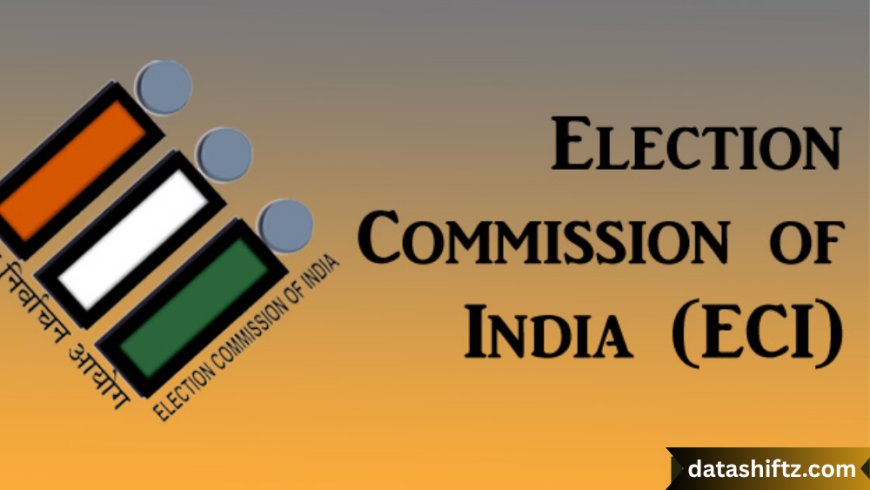Election Commission of India: Guardian of the World's Largest Democracy

Introduction
The Election Commission of India (ECI) is the backbone of India's democratic system. Tasked with the responsibility of conducting free, fair, and impartial elections, the ECI plays a pivotal role in upholding the democratic values enshrined in the Constitution of India. As the world’s largest democracy, the functioning of India’s electoral machinery has global relevance and admiration.
From ensuring ethical political practices to enforcing the Model Code of Conduct, the Election Commission of India has grown into a powerful constitutional authority. With general elections involving over 950 million registered voters, managing India's electoral process is nothing short of a herculean task. This article explores the formation, structure, powers, functions, challenges, and innovations of the ECI.
Historical Background and Constitutional Mandate
Establishment of the Election Commission
The Election Commission of India was established on 25th January 1950, a day now celebrated as National Voters' Day. It derives its authority from Article 324 of the Indian Constitution, which provides for the superintendence, direction, and control of elections to the Parliament, State Legislatures, and the offices of the President and Vice-President.
Initially, the commission was a single-member body, but it was expanded to a three-member body in 1993 to handle the increasing responsibilities.
Constitutional Articles Related to ECI
| Article | Provision Description |
|---|---|
| 324 | Superintendence, direction, and control of elections |
| 325 | No person to be ineligible for inclusion in electoral rolls based on religion, race, caste, or sex |
| 326 | Elections to the Lok Sabha and State Assemblies to be based on adult suffrage |
| 327 | Power of Parliament to make provisions with respect to elections |
| 328 | Power of State Legislature to legislate on state elections |
| 329 | Bar on interference by courts in electoral matters |
Structure of the Election Commission of India
Composition and Tenure
As of today, the Election Commission is a three-member body comprising:
-
Chief Election Commissioner (CEC)
-
Two Election Commissioners
The President of India appoints the CEC and the other Election Commissioners. They enjoy a tenure of six years or up to the age of 65 years, whichever is earlier.
Current Members of ECI (As of 2025)
| Name | Designation | Year Appointed |
|---|---|---|
| Shri Rajiv Kumar | Chief Election Commissioner | 2022 |
| Shri Arun Goel | Election Commissioner | 2022 |
| Shri Anup Chandra Pandey | Election Commissioner | 2021 |
Roles and Responsibilities of the Election Commission
Core Functions
The Election Commission ensures that elections are conducted in a free, fair, and unbiased manner. Its primary functions include:
✅ Electoral Functions
-
Conduct elections to the Lok Sabha, Rajya Sabha, State Legislative Assemblies, and Legislative Councils.
-
Conduct elections to the offices of the President and Vice-President.
-
Prepare, revise, and update electoral rolls.
-
Allocate election symbols to political parties and candidates.
-
Register political parties and monitor their compliance.
✅ Administrative Functions
-
Appoint observers for election monitoring.
-
Supervise polling staff and security forces.
-
Issue guidelines under the Model Code of Conduct.
-
Take action against violations by parties or candidates.
✅ Judicial Functions
-
Settle disputes related to recognition and de-recognition of political parties.
-
Adjudicate on election-related complaints and issues.
-
Disqualify candidates based on corrupt practices or criminal records.
Powers of the Election Commission
The Election Commission has been granted quasi-judicial powers and autonomy to ensure electoral integrity. Some of these include:
Key Powers of ECI in List Format
-
Postponement of Elections during natural disasters or emergencies.
-
Disqualification of candidates for violating electoral laws.
-
Cancellation of polls in cases of malpractice.
-
Monitoring and regulation of election expenses.
-
Seizure of illegal campaign material and cash.
-
Deployment of paramilitary forces during sensitive elections.
-
Ban on exit polls and publication of misleading content during voting phases.
Electoral Process in India
Key Stages in Election Process
| Stage | Description |
|---|---|
| Delimitation | Redrawing of electoral boundaries based on population |
| Preparation of Rolls | Voter registration and verification |
| Notification | Official announcement of election dates |
| Nomination | Filing of candidature by political aspirants |
| Scrutiny | Validation of nomination papers |
| Withdrawal | Candidates may withdraw their nominations |
| Campaigning | Political rallies, speeches, media campaigns |
| Polling | Voting through EVMs and VVPATs |
| Counting | Counting of votes and declaration of results |
Technological Innovations and Reforms
Digital Transformation in Elections
In recent decades, the ECI has embraced technology to increase efficiency, transparency, and accessibility.
Major Technological Reforms
| Innovation | Description |
|---|---|
| Electronic Voting Machines (EVMs) | Introduced in 1998 to eliminate manual errors and booth capturing |
| Voter Verifiable Paper Audit Trail (VVPAT) | Introduced in 2013 to ensure transparency in voting |
| cVIGIL App | Mobile app for citizens to report violations in real-time |
| National Voters Service Portal (NVSP) | Online platform for voter registration and corrections |
| Booth Level Monitoring | Real-time web-based monitoring of polling stations |
Challenges Faced by the Election Commission
Major Concerns
Despite its robust framework, the ECI faces numerous challenges:
???? Political Pressure
The ECI has often been accused of bias or leniency towards ruling parties. Ensuring impartiality is a constant challenge.
???? Electoral Malpractices
-
Vote buying, booth capturing, and false voting still occur in some regions.
-
Criminalization of politics remains a serious issue.
???? Fake News and Social Media
Misinformation spread via WhatsApp, Facebook, and Twitter during elections often manipulates public opinion.
Landmark Decisions and Controversies
Notable Cases
✔️ Disqualification of Indira Gandhi (1975)
The Allahabad High Court declared Prime Minister Indira Gandhi's election invalid, leading to the Emergency.
✔️ Ban on Campaigning
ECI has banned political leaders like Yogi Adityanath, Azam Khan, and others in the past for hate speech violations.
✔️ Enforcement of MCC
Strict implementation of the Model Code of Conduct during elections has led to various FIRs and disqualifications.
Importance of the Election Commission in a Democracy
Why the ECI Matters
The Election Commission is often referred to as the "watchdog of democracy". Its neutrality, autonomy, and commitment to democratic processes are what keep India’s multi-party political system functioning effectively.
Impact on Democratic Values (List Format)
-
???? Ensures voter equality and transparency.
-
???? Prevents rigging and electoral fraud.
-
???? Regulates campaign financing and election expenditures.
-
???? Strengthens citizen trust in democratic institutions.
-
???? Encourages higher voter turnout through awareness campaigns.
Suggestions for Future Reforms
How the ECI Can Improve
-
Make ECI appointments through a bipartisan committee to ensure transparency.
-
Introduce remote voting mechanisms for migrant workers and NRIs.
-
Curb anonymous political donations to reduce black money in elections.
-
Enhance cyber-security to deal with digital threats and hacking.
-
Strengthen legal teeth to punish election code violations swiftly.
Conclusion
The Election Commission of India stands as a symbol of India’s democratic strength. From overseeing complex electoral logistics to enforcing ethical conduct, the ECI has played a pivotal role in preserving the integrity of Indian democracy. In a country as vast, diverse, and politically vibrant as India, conducting smooth and credible elections is no small feat—and the ECI has done it time and again with remarkable efficiency.
As India continues to evolve, so must its electoral processes. With increased political awareness, voter participation, and technological innovations, the future of India’s democratic framework looks promising—provided that the Election Commission retains its autonomy, integrity, and accountability.




























